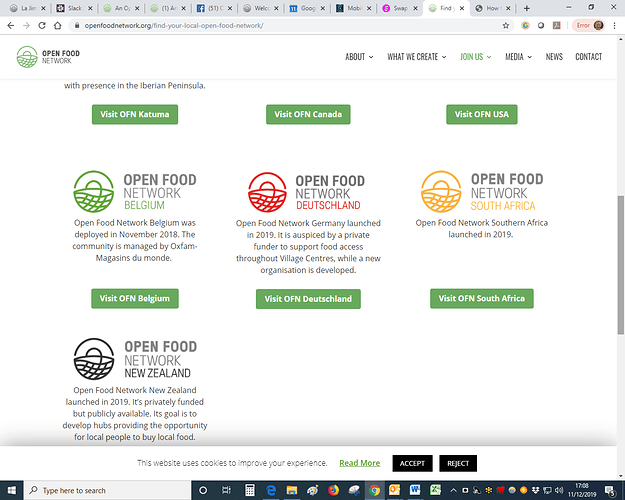Recently @danielle and I put some thought into the question "How might we build thriving local instances that strengthen the global project?"
These are some of our questions and suggestions:
There is a collective view within our community that the Open Food Network be available for any group or locality to set up and become an affiliate and a member of the global community.
We can see that there is strength in a diverse and distributed community of instances who all contribute to the global commons. So, we want to focus on better building new instances by developing a method to better onboard affiliates.
 If we put on our product thinking hats…
If we put on our product thinking hats…
- Can we define what the value is for OFN global in bringing on new affiliates?
- Why do we want them?
- What’s the success rate for bringing in new affiliates?
- What’s the effort/cost outlay?
- Do we feel we’re currently getting a return on investment?
- What characteristics of a potential affiliate make them more likely to succeed?
- What characteristics make them a valuable global contributor?
Definition of a thriving local instance
- Sustainable
- Funds
- Team
- Energy
- Connection into global project
- Increasing customer numbers
- Contributing to but not reliant on global support for day-to-day operations
- Contribution to global development pot
- ?? What would you add?
Where we are now
What works well
- Nick is amazing and welcoming new potential instances to the world of OFN. His wealth of knowledge about the project, his care and enthusiasm, are all good learning tools for new countries to understand what it means to join the project and what the clear and distinct OFN culture is that they would be integrating into by joining.
- We’ve had success onboarding via global gatherings, ie. Belgium in 2018. We were able to build trust in this method which made the onboarding and set up process.
- ?? What would you add?
What are some of the problems we have
- Nick and his precious time don’t scale well, as we get more and more countries enquiring (or re-enquiring via new people) about joining the project.
- We don’t yet know what makes for a successful instance model, nor what process would best set them up to be successful.
- We’re very responsive in the way we onboard rather than taking a more strategic, goal oriented and planned approach.
- We are reactive more than proactive, offering unstructured and somewhat haphazard assistance and advice.
- We have a wealth of knowledge from existing instances about what worked/didn’t work for them and what in hindsight they would have done differently, but we don’t use this distributed knowledge to improve or aid the onboarding process.
- Current instances are still not thriving, with some not fully launched and running after a significant amount of time.
- Lots of effort expended for a pretty low conversion rate.
- Dev interruptions for deployment assistance by potential affiliates takes time away from the very small delivery pipe.
- ?? What would you add?
Where we want to get to
< success indicators - what do we as a community define these as?? >
How we get there
A more strategic onboarding path: Action learning across instances
We propose running an action learning set that brings together existing and new/potential instances to share and improve practice, working through a curriculum of topics that we believe will help share successes and failures and get new instances thriving more quickly, and help existing instances improve.
This outlines some recommended instance-startup steps that we believe will better set up new affiliates for success. These could form the basis of action learning sets.
Initial contact / expressions of interest
- Fall in love with OFN
- Sign the pledge as an affiliate
- Understand the path you’re about to take: the good, the bad, the ugly
Build a viable business case
First…
- Define strategy
- Vision, mission, goals
- Theory of change
- Know your target community (customers, understand segments and their viability), start building your community
- Build skills / recruit the team (what’s there, what path is best based on who’s leading? how do you gather the rest of those skills/people?)
- Find seed funding
Then…
- Run a pilot to test the business case (verify assumptions using lean experiments)
- First deployment of software
- Pilot partners from your community (early adopters)
- Observe, tweak, evolve
- Find launch funding
Then…
- Launch
- Develop sustainable business model
One of the other ideas we pondered was if there should be any restrictions on how much support a new instance can get from the global support team if they haven’t worked through a) these steps on their own or preferably b) these steps with other instances as part of an action learning set. For example, should it be a precondition of being put on the global sys admin list that you have developed a business case through talking with users in your country? That you have recruited at least a second person to help? That you have built a partnership with one or two early adopters to help you pilot? (I don’t think finding funding should be a precondition to support, but I think looking for funding is a key activity that should be encouraged, and launching presents a great opportunity)
There are some challenges with the idea of action learning sets, similar to our challenges for many of our governance meetings: language, time zones, technology to successfully video chat (for some people).
What are your thoughts? Do we need to improve? Will this help new instances? Existing instances?
